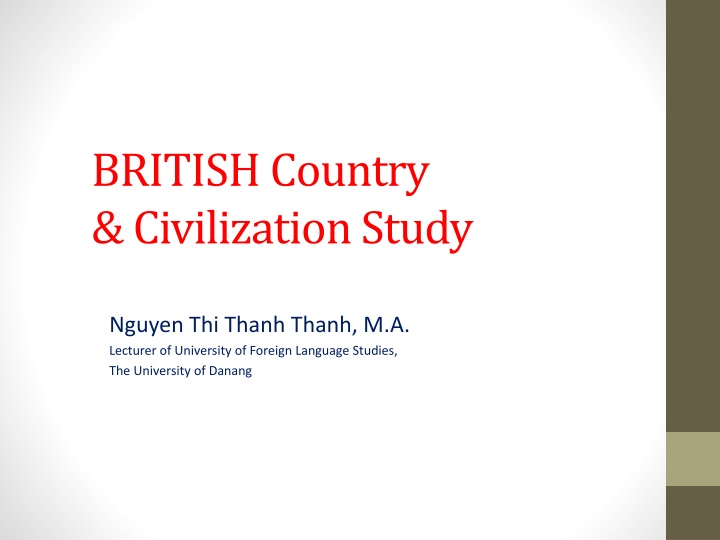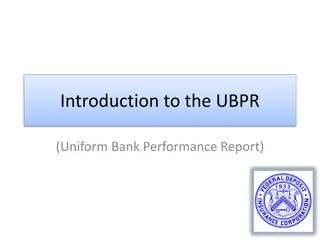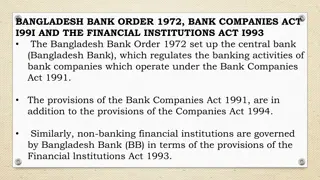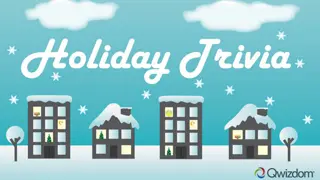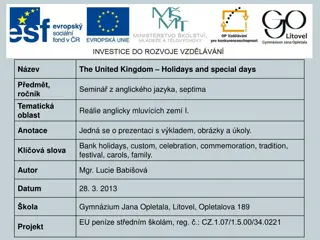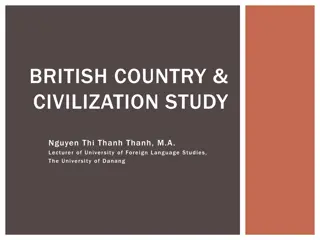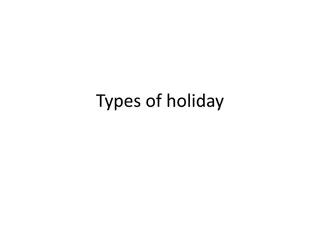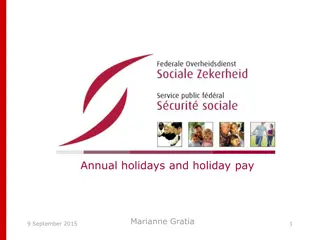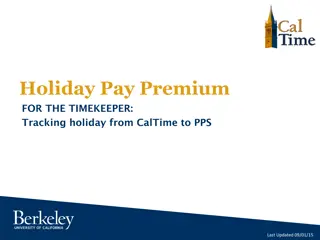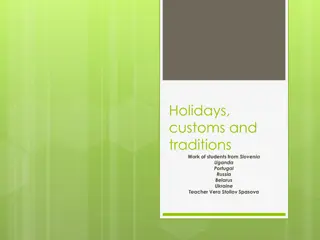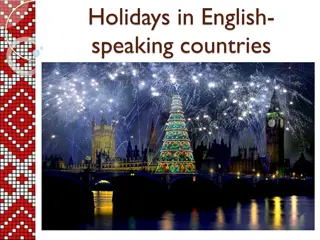British Holiday Traditions and Bank Holidays Overview
Exploring British holiday traditions, vacations, and bank holidays, this study covers the significance of holidays in the UK, including vacation patterns, paid leaves, and common travel destinations. It delves into the differences between holidays in British English and American English, highlighting the cultural importance of holidays in British society.
Download Presentation

Please find below an Image/Link to download the presentation.
The content on the website is provided AS IS for your information and personal use only. It may not be sold, licensed, or shared on other websites without obtaining consent from the author.If you encounter any issues during the download, it is possible that the publisher has removed the file from their server.
You are allowed to download the files provided on this website for personal or commercial use, subject to the condition that they are used lawfully. All files are the property of their respective owners.
The content on the website is provided AS IS for your information and personal use only. It may not be sold, licensed, or shared on other websites without obtaining consent from the author.
E N D
Presentation Transcript
BRITISH Country & Civilization Study Nguyen Thi Thanh Thanh, M.A. Lecturer of University of Foreign Language Studies, The University of Danang
BRITISH Holiday Nguyen Thi Thanh Thanh, M.A. Lecturer of University of Foreign Language Studies, The University of Danang
COURSE SYLLABUS BCSB1 WEEK TITLE UNIT 1: THE UNITED KINGDOM 1 UNIT 2: PEOPLE AND LANGUAGE 2 UNIT 3: SOME IMPORTANT EVENTS IN BRITISH HISTORY Assignment 1 3 -4 UNIT 4: GOVERNMENT 5 UNIT 5: EDUCATION UNIT 6: HOLIDAY Assignment 2 6 7-8
British Holiday Holiday in British English eans a period of a week or more spent away from work or school. This is called a vacation in American English. So, the period of several weeks around Christmas when schools are closed the Christmas holiday in Britain/ the Christmas vacation in the US. Holiday and vacation: people go away for a time to a beach resort or to the country, or go travelling.
British Holiday British people have about four weeks' paid leave from their jobs. Most take their main holiday in the summer. Some travel to the US or visit India, the Far East and other parts of the world (package holidays). Some people see their holidays as an opportunity to relax in the sun, but others prefer activity holidays during which they can visit famous buildings or go walking in the countryside. People often arrange their holiday a long time in advance and look forward to it through the winter.
Exercises Complete the following sentences with information from the text above. 1. Holiday means a period............................ 2. British people have about four weeks.................... 3. Most people take their holiday in ................... 4. In the off-season there are ....................... 5. Package holidays include...................
British Holiday Bank holidays in the UK In Britain a bank holiday is an official public holiday (on a day other than Saturday or Sunday) when all banks and post offices are closed, as well as most factories, offices and shops. New Year s Day UK Good Friday UK Easter Monday England, Wales and Northern Ireland Early May Bank Holiday UK Spring Bank Holiday UK Summer Bank Holiday England, Wales and Northern Ireland Christmas Day UK Boxing Day UK In addition, there are various traditional local holidays in Scotland, Northern Ireland that are determined by the local authorities there.
New Year holiday New Year s Eve is on 31 December, the last day before the New Year begins. In many places, people go to parties, bars or restaurants with friends in the evening. Sometimes they meet outside in a big square. In London, people go to Trafalgar Square. Just before midnight, people look at the clock, and together they count the last ten seconds before the New Year begins: Ten, nine, eight ...
New Year holiday New year song called Auld Lang Syne . It is about remembering old friends. Many people drink a glass of champagne, light some fireworks, or dance until the sun comes up. In Scotland, New Year s Eve has a special name: Hogmanay. At Hogmanay, there is a tradition called first footing First footer will bring good luck (He must carry some food, some money, or a piece of coal for the fire)
New Year holiday New Year s Day is 1 January, the first day of the New Year. It is a holiday for most people, and the banks and many shops don t open. Many people stay at home on that day and rest. Most people go back to work on 2 January, but in Scotland they have two days holiday and go back to work on 3 January.
Valentines Day Valentine s Day started over two thousand years ago, as a winter festival, on 15 February. . The story? (picture of Valentine)
Valentines Day In the early 19th century, when the post office started in Britain, people started to send valentine s cards to the person they loved on 14 February. The cards had pictures of flowers and birds on, and words inside like: Roses are red, my love, Violets are blue, Sugar is sweet, my love, But not as sweet as you.
Valentines Day People still send each other Valentine s cards, but often they do not write their names inside: they just write Be me Valentine, or From your Valentine . It is a kind of game. Some children give their friends or teachers cards or chocolates. A man will perhaps give his girlfriend or wife red roses. A lot of people go out to restaurants for the evening and have dinner for two, with candles and soft music.
Easter Easter is the most important festival in the church year: more important than Christmas. It begins with Good Friday, the Friday before Easter, which is the day the Romans killed Jesus Christ, in Jerusalem, about two thousand years ago. In the Christian religion it represents the day on which Christ died. It is a bank holiday in Britain.
Easter Two days, later, on Easter Sunday, Christians believe that Jesus returned to life. Easter Day is the Sunday after the first full moon after the first day of spring (21 March). It is different every year, but always between 22 March and 25 April. Spring Many animals and birds are born in the spring. So when people started to send Easter cards in the nineteenth century (the cards baby sheep, rabbits or birds). pictures
Easter Eggs are an important part of Easter because they mean spring and new life. One Easter tradition is egg rolling . (People decorate eggs with different colours, then take the eggs to the top of a hill and the eggs roll down. The first egg to get to the foot of the hill is the winner) On Easter Sunday, people give chocolate Easter eggs as presents. Today some of the eggs are empty, others have small chocolates inside; some are very small, some very big.
Easter Some mothers and fathers tell their children that the Easter Rabbit brings the eggs and hides them in the garden. The children must go outside and look for them. Many people also eat hot cross buns at Easter Some women and girls decorate hats, called Easter bonnets, and wear them in Easter bonnet parades. Many people go to church on Easter Day. Easter Monday is a holiday for everyone, so a lot of people watch some sport, or go out for the day. Children usually have a week or two holidays from school around Easter.
Pancake Day Pancakes first appeared in English cookbooks in the 15th century. In Britain and Ireland in particular, a number of traditions have grown up around the eating of pancakes. On Pancake Day, pancake races are held in villages and towns across Britain.
The tradition of pancake racing had started since 1445. (The contestants, traditionally women, carry a frying pan and race to the finishing line tossing the pancakes as they go. some skills are required to toss pancakes successfully while running. The winner is the first to cross the line having tossed the pancake a certain number of times) The tradition??
April Fools Day April 1st is April Fools Day. (A day when people play practical jokes on each other). Here are some of the most memorable ones in England: In 1957 Panorama, a TV programme, fooled millions of Brits into believing that spaghetti grows on trees! In 1980 the BBC reported that Big Ben, in order to keep up with the times, was going to be given a digital readout. It received a huge response from listeners protesting the change.
May Day May Day is the first day of May, which has been marked in Britain for many centuries by outdoor events held to celebrate the arrival of spring. May Day itself is not necessarily a holiday in Britain, but since 1978 there has been a bank holiday on the Monday closest to 1 May, called the Early May Bank Holiday. In some countries, though not in Britain, May Day has been an occasion for socialist celebrations, often involving military parades
May Day In Britain, traditional events on or near May Day include: dancing round the maypole and choosing a May Queen. May Queen (also Queen of the May) is a pretty girl who is chosen in a town or village to be the central figure of traditional May Day celebrations in Britain. She wears a crown of flowers and may be driven through the streets on an open vehicle.
Halloween 31 October was called All Hallow s Eve, and slowly the name changed to Hallowe en. In November, winter is near, and hundreds of years ago people believed that bad spirits, like ghosts, came in the winter. They wanted the bad spirits to go away, so they made fires outside and used big autumn fruit or vegetables to make jack o lanterns. (A lantern is a kind of light, and some people think Jack was a nightwatchman who had one of these lights) To make a jack o lantern, people cut a hole in a large fruit - usually a pumpkin. Then they put a candle in the hole, and cut a face in the side so the light was easy to see.
Halloween Another thing people did, to make the spirits go away, was to dress like witches and ghosts. Children still do this if they go to Hallowe en parties. One Hallowe enparty game is called bobbing for apples . Treat or Trick
Christmas At Christmas, people remember when Jesus Christ was born and the Christian religion started. Today, Christmas is a very important time in the Christian year, but it is also very important to those who do not go to church. It is a time for buying and giving presents, having parties, and being with family. People start to get ready for Christmas in late October or early November. Shop-keepers decorate their shops with lights, trees and other decorations, and shoppers start to look for presents. People with family and friends in other countries often send them cards and presents, and everyone begins to make plans for the coming holiday.
Christmas In the middle of December, most families buy Christmas trees decorate them The Christmas holiday begins on 24 December: Christmas Eve. People: stop work early + cover the presents in special paper, putting them under the tree. Children leave a stocking for Santa Claus when they go to bed.
Exercises Complete the following sentences with information from the text above On Valentine s Day people ... For Christian people Easter is ... Easter is celebrated on ... Traditional events of May day include ... People make jack o lantern ... When going trick or treating children ... Christmas season starts from ... to ... People usually spend Christmas time ... Christmas presents are put ... At Christmas Eve children ... On December 26 people used to ...
SUMMARY: BRITISH HOLIDAY New year Holidays Valentine Day Easter Pancake Day April Fools Day May Day Halloween Chritsmas NEXT LESSON:
THANK YOU FOR YOUR LISTENING
